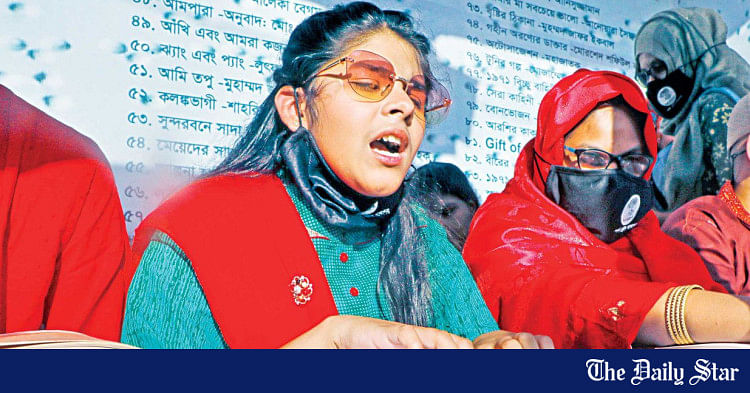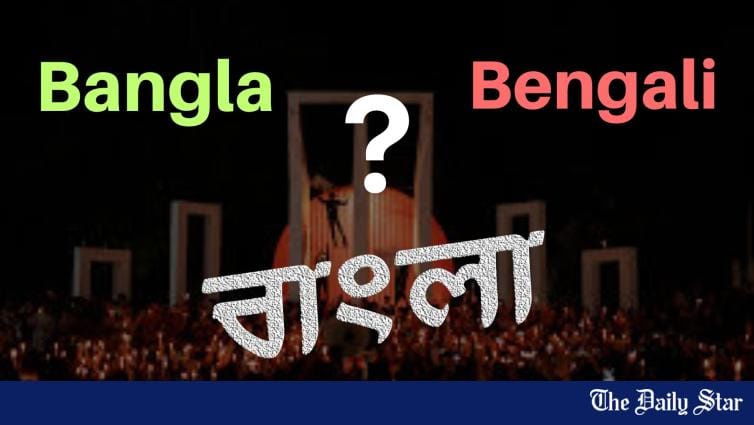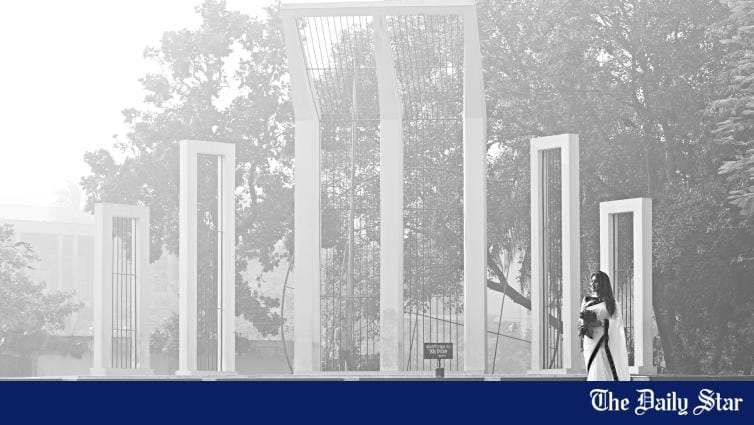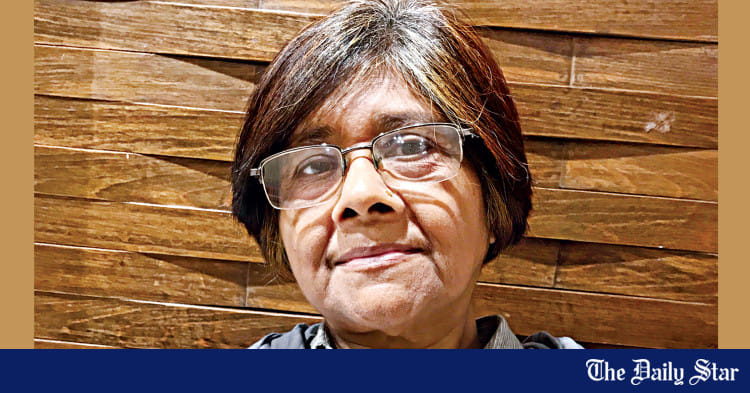Saif
Senior Member
- Joined
- Jan 24, 2024
- Messages
- 17,300
- Likes
- 8,334
- Nation

- Residence

- Axis Group


Is Bangla prepared for the future?
We fail to realise that while there is emotional value in constructing a platform of the past, there is hardly any room for sentiment and emotion in the daily struggles of the real world. A language must be prepared to face the future, must compete with other languages, must struggle against...
Is Bangla prepared for the future?
The question is, how prepared for the future is the Bangla language? What is the condition of our institutional initiatives to learn and teach Bangla? How far have the government's efforts proceeded to creating a nexus between the Bangla language and technology? Is Bangladesh about to face any new threat ahead?
Sumon Sajjad
Updated: 21 Feb 2025, 18: 01

Central Shaheed Minar File photo
There is a sense of nationalistic emotion and pride attached to the history of the Bangla language. But this retrospective tendency has held us back from comprehending issues pertaining to the advance of the language. We fail to realise that while there is emotional value in constructing a platform of the past, there is hardly any room for sentiment and emotion in the daily struggles of the real world.
A language must be prepared to face the future, must compete with other languages, must struggle against the cultural and socioeconomic challenges. Back in the day Bangladesh was relinquished from the dominance of English. Then there was the struggle against Urdu. Then, when needed, compromise had to be made with Arabic, Farsi, English, Urdu and Hindi. Or else, the very structure of Bangladesh would not have been created.
The question is, how prepared for the future is the Bangla language? What is the condition of our institutional initiatives to learn and teach Bangla? How far have the government's efforts proceeded to creating a nexus between the Bangla language and technology? Is Bangladesh about to face any new threat ahead?
We see a threat ahead in the form of the neo-domination of the English language. English has an extremely strong impact on Bangladesh. English has become the major language of globalisation and new technologies. New media and English are inextricably linked. As consumers of cultural components and content, the Bangla language populace is obliged to enter this language sphere. Most of the massive content churned out continuously on Facebook and YouTube is English-dependent. So naturally this leaves a mark on the audience.
Such content and translation basically are artificially generated. The words are Bangla, but the sentence composition is in English style. Sometimes the syntax is fine, but the application of words is inappropriate. There are spelling errors galore
As a result, English continues to dominate over Bangla. A propensity has developed to unnecessarily use English words in place of Bangla. This is increasing both in writing and speaking. English words and phrases are working their way into Bangla syntax. The fallout is that it is normalising the use of English and the mindset to choose alternative English expressions. It is not as if Bangla is inadequate to express one's thoughts. On the contrary, the failure to use Bangla is harming the natural application of the language.
Bangla is facing yet another danger and that is the use of AI to write and translate in Bangla. In recent times many students have been resorting to ChatGPT to write in Bangla, producing their written material in no time at all. Some are using Google translator to translate from English to Bangla. Even school children are resorting to the same.
Such content and translation basically are artificially generated. The words are Bangla, but the sentence composition is in English style. Sometimes the syntax is fine, but the application of words is inappropriate. There are spelling errors galore. Back in the 19th century, the English scholars of Fort William College or the Srirampur Mission would write such Bangla. We don't want to see a repetition of such weak Bangla written by those whose language is Bangla. We don't want to see the future generation being trapped in such a cage of Bangla either. If we don't want that, then we must prepare accordingly.
We need a language commission. The task of the commission, comprising language experts, linguists, researchers, academics, language technologists and government representatives, will be to take the prevailing state of the language into cognizance and come up with a language policy.
Recently I was aghast when I opened a translated book on folklore. Due to weak mechanical translation into Bangla, the entire content had a stamp of English. I was equally shocked to read a feature in a Bangla daily where the writer had resorted to artificial translation support.
AI influence is impacting the thoughts and writing processes of students and writers. Technology-dependency is ruining creative Bangla writing that springs from the imagination. Without using our primary faculties, we simply embark on the use of ChatGPT, and so relevant and essential words are not being stored in our memory banks, we are not building up our vocabulary. The concept of copyright and author's exclusive rights are diminishing.
Does that mean we can overlook technological realities? Possibly not. We must accept new technology and deal with the emerging problems. We have to take Bangla to technology, have to make Bangla dictionaries, spelling rules and grammar easily accessible. More effective than pdf versions of Bangla dictionaries would be a website where you can select your word, check synonyms, look into the roots of the word, its applications, both old and contemporary.
Technology should be used to prepare the scope of teaching and learning Bangla. The steady development of technology makes it easy to understand that the languages of the world will draw close to each other. The language which can use technology to strengthen itself will be able to boost its competence more. According to Duolingo, the institution of language-learning technology, in the Covid situation, Spanish became the second-most language for study. Technology had a positive role to play in this regard.
We can think of games and apps dedicated to Bangla learning. We can think of online editions of Bangla grammar which local and non-local people can consult as needed and to clear up confusions in one's own writing. But the question is, who will do this? Do we have any language planning? The answers are in the negative.
The national education policy does have certain sections and sub-sections on language. In 2024 a policy was formulated for AI. It speaks of clearing language hindrances by means of AI. But Bangladesh has no language policy. But a language cannot growth without a policy and planning. It will not be possible to prevent intellectual thought being taken over by artificial intelligence. Over all, Bangla is not prepared for the future.
We need a language commission. The task of the commission, comprising language experts, linguists, researchers, academics, language technologists and government representatives, will be to take the prevailing state of the language into cognisance and come up with a language policy. This policy will deal with the present use and scope of the language. And priority will be given to Bangla appropriate for the future.
The question is, how prepared for the future is the Bangla language? What is the condition of our institutional initiatives to learn and teach Bangla? How far have the government's efforts proceeded to creating a nexus between the Bangla language and technology? Is Bangladesh about to face any new threat ahead?
Sumon Sajjad
Updated: 21 Feb 2025, 18: 01
Central Shaheed Minar File photo
There is a sense of nationalistic emotion and pride attached to the history of the Bangla language. But this retrospective tendency has held us back from comprehending issues pertaining to the advance of the language. We fail to realise that while there is emotional value in constructing a platform of the past, there is hardly any room for sentiment and emotion in the daily struggles of the real world.
A language must be prepared to face the future, must compete with other languages, must struggle against the cultural and socioeconomic challenges. Back in the day Bangladesh was relinquished from the dominance of English. Then there was the struggle against Urdu. Then, when needed, compromise had to be made with Arabic, Farsi, English, Urdu and Hindi. Or else, the very structure of Bangladesh would not have been created.
The question is, how prepared for the future is the Bangla language? What is the condition of our institutional initiatives to learn and teach Bangla? How far have the government's efforts proceeded to creating a nexus between the Bangla language and technology? Is Bangladesh about to face any new threat ahead?
We see a threat ahead in the form of the neo-domination of the English language. English has an extremely strong impact on Bangladesh. English has become the major language of globalisation and new technologies. New media and English are inextricably linked. As consumers of cultural components and content, the Bangla language populace is obliged to enter this language sphere. Most of the massive content churned out continuously on Facebook and YouTube is English-dependent. So naturally this leaves a mark on the audience.
Such content and translation basically are artificially generated. The words are Bangla, but the sentence composition is in English style. Sometimes the syntax is fine, but the application of words is inappropriate. There are spelling errors galore
As a result, English continues to dominate over Bangla. A propensity has developed to unnecessarily use English words in place of Bangla. This is increasing both in writing and speaking. English words and phrases are working their way into Bangla syntax. The fallout is that it is normalising the use of English and the mindset to choose alternative English expressions. It is not as if Bangla is inadequate to express one's thoughts. On the contrary, the failure to use Bangla is harming the natural application of the language.
Bangla is facing yet another danger and that is the use of AI to write and translate in Bangla. In recent times many students have been resorting to ChatGPT to write in Bangla, producing their written material in no time at all. Some are using Google translator to translate from English to Bangla. Even school children are resorting to the same.
Such content and translation basically are artificially generated. The words are Bangla, but the sentence composition is in English style. Sometimes the syntax is fine, but the application of words is inappropriate. There are spelling errors galore. Back in the 19th century, the English scholars of Fort William College or the Srirampur Mission would write such Bangla. We don't want to see a repetition of such weak Bangla written by those whose language is Bangla. We don't want to see the future generation being trapped in such a cage of Bangla either. If we don't want that, then we must prepare accordingly.
We need a language commission. The task of the commission, comprising language experts, linguists, researchers, academics, language technologists and government representatives, will be to take the prevailing state of the language into cognizance and come up with a language policy.
Recently I was aghast when I opened a translated book on folklore. Due to weak mechanical translation into Bangla, the entire content had a stamp of English. I was equally shocked to read a feature in a Bangla daily where the writer had resorted to artificial translation support.
AI influence is impacting the thoughts and writing processes of students and writers. Technology-dependency is ruining creative Bangla writing that springs from the imagination. Without using our primary faculties, we simply embark on the use of ChatGPT, and so relevant and essential words are not being stored in our memory banks, we are not building up our vocabulary. The concept of copyright and author's exclusive rights are diminishing.
Does that mean we can overlook technological realities? Possibly not. We must accept new technology and deal with the emerging problems. We have to take Bangla to technology, have to make Bangla dictionaries, spelling rules and grammar easily accessible. More effective than pdf versions of Bangla dictionaries would be a website where you can select your word, check synonyms, look into the roots of the word, its applications, both old and contemporary.
Technology should be used to prepare the scope of teaching and learning Bangla. The steady development of technology makes it easy to understand that the languages of the world will draw close to each other. The language which can use technology to strengthen itself will be able to boost its competence more. According to Duolingo, the institution of language-learning technology, in the Covid situation, Spanish became the second-most language for study. Technology had a positive role to play in this regard.
We can think of games and apps dedicated to Bangla learning. We can think of online editions of Bangla grammar which local and non-local people can consult as needed and to clear up confusions in one's own writing. But the question is, who will do this? Do we have any language planning? The answers are in the negative.
The national education policy does have certain sections and sub-sections on language. In 2024 a policy was formulated for AI. It speaks of clearing language hindrances by means of AI. But Bangladesh has no language policy. But a language cannot growth without a policy and planning. It will not be possible to prevent intellectual thought being taken over by artificial intelligence. Over all, Bangla is not prepared for the future.
We need a language commission. The task of the commission, comprising language experts, linguists, researchers, academics, language technologists and government representatives, will be to take the prevailing state of the language into cognisance and come up with a language policy. This policy will deal with the present use and scope of the language. And priority will be given to Bangla appropriate for the future.
- Sumon Sajjad is a professor of the Bangla department at Jahangirnagar University.
- This column appeared in the print and online edition of Prothom Alo and has been rewritten for the English edition by Ayesha Kabir






































